【Event Report】 “Ivory-Free Koto Concert” proved tradition can be passed down without ivory
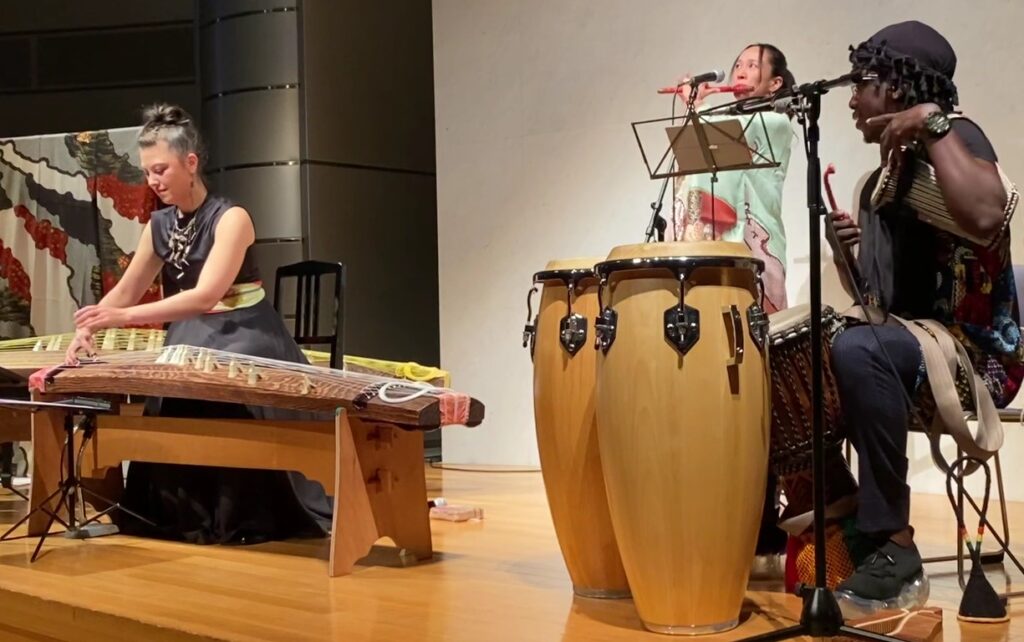
The Japan Wildlife Conservation Society (JWCS), a certified NPO tackling issues in endangered wildlife trade, held an “Ivory-Free Koto Concert: An Evening with a View of Koto Music Horizon” on October 31, 2025.
The performance using a newly developed ivory substitute material drew generous applause from the audience.
Japanese Government Refuses to Close Domestic Ivory Market—But Japanese Consumers Don’t Need Ivory
Major ivory-consuming countries worldwide have banned domestic ivory trade. However, Japan still allows ivory to be sold openly in stores, making it accessible to anyone. This has drawn criticism from elephant range states and others, who argue Japan should comply with CITES (Convention on International Trade in Endangered Species of Wild Fauna and Flora) recommendations to close its domestic ivory market.
The Japanese government refuses to close its domestic ivory market, citing the need to protect the ivory industry. Yet Japanese consumers no longer need ivory.
There remains a small demand for ivory for traditional Japanese musical instruments. Therefore, we held a koto concert featuring koto plectrums and bridges made from a new material, developed with a focus on enhancing the quality of traditional Japanese music performance.
This concert marked the first collaboration between African traditional percussion and the koto, expressing through music both the protection of African elephants and the future of Japanese traditional music.
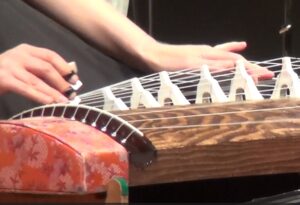
Event Overview
1. Opening Remarks
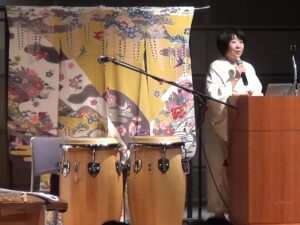 Ms. Kirie Suzuki, Secretary General of the Certified NPO Japan Wildlife Conservation Society, the organizer of the event, shared her experience participating in the CITES Conference of the Parties. At a side event during the 2013 Conference of the Parties—a time when elephant poaching by armed groups and illegal ivory trade were rampant in Africa, a moment of silence was held to mourn rangers and villagers killed in gun battles with poachers. At the 2016 Conference of the Parties, during a side event, a government representative from West Africa confronted Japan’s government representative, demanding, “Why does Japan want ivory while poachers are killing our elephants and people?”
Ms. Kirie Suzuki, Secretary General of the Certified NPO Japan Wildlife Conservation Society, the organizer of the event, shared her experience participating in the CITES Conference of the Parties. At a side event during the 2013 Conference of the Parties—a time when elephant poaching by armed groups and illegal ivory trade were rampant in Africa, a moment of silence was held to mourn rangers and villagers killed in gun battles with poachers. At the 2016 Conference of the Parties, during a side event, a government representative from West Africa confronted Japan’s government representative, demanding, “Why does Japan want ivory while poachers are killing our elephants and people?”
She then spoke about the significance of finally being able to hold this concert using alternative materials developed for Japanese musical instruments, which needed ivory.
2. Presentations (Summary)
“Elephant Poaching and Japan’s Ivory Market”
Masayuki Sakamoto, Cerfified NPO Japan Tiger and Elephant Fund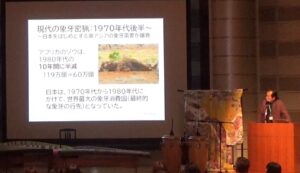
Elephants and human ancestors both originated and evolved in Africa, yet elephants have been hunted by humans since before ancient civilizations.
In modern times, ivory became a raw material for industrial products. Particularly from the late 1970s, demand for ivory surged in East Asia, including Japan, intensifying ivory poaching in Africa. Although international ivory trade was banned under CITES in 1989, domestic ivory markets persisted. In Japan, the “seal business of telling fortune” expanded demand for ivory seals.
From the mid-2000s, China’s domestic ivory market expanded, causing elephant poaching to become severe once again. In 2016, CITES adopted a recommendation for the closure of domestic ivory markets. While the Japanese government has not accepted this recommendation, he argued that if no one in Japan bought ivory, the ivory market would disappear.
“The Challenge of Finding Alternatives to Ivory to Protect African Elephants – Nanoforest, a New Material Made from Renewable Resources”
Hashiba Hiromi, Development Department, Chuetsu Pulp Industry Co., Ltd.
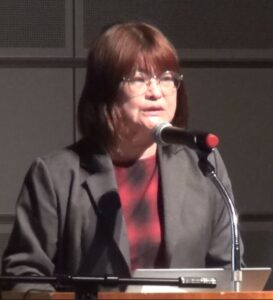 Chuetsu Pulp Industry Co., Ltd. manufactures and sells cellulose nanofibers (CNF, product name: nanoforest), which are finely divided pulp, and is advancing research and development toward practical use.
Chuetsu Pulp Industry Co., Ltd. manufactures and sells cellulose nanofibers (CNF, product name: nanoforest), which are finely divided pulp, and is advancing research and development toward practical use.
They are the only company producing pulp from bamboo. Approximately 40% of Japan’s bamboo is located in Kyushu, where abandoned bamboo forests are currently a significant problem. These neglected forests encroach on woodlands, making proper bamboo forest management essential for both mountain forest cultivation and bamboo shoot production. They have initiated efforts to utilize this bamboo material for pulping and paper manufacturing.
The koto bridges are made by blending nanoforest—using bamboo raw materials—into a plant-based resin, and the koto plectrum is carved from a nanoforest block. Both, developed as an ivory substitute would be used in this concert.
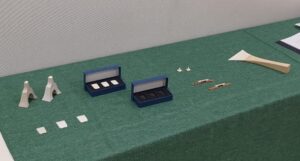
Japanese musical instruments made from new ivory substitute materials
3. Performance
The first and second pieces, koto solos, were performed without microphones to allow the audience to hear the sound of the ivory substitute. The collaboration with African percussion instruments reminded listeners of ivory’s origins, creating a concert where the entire venue collectively felt the potential of Japanese traditional music to connect with the world by choosing not to use ivory.
Ivory-Free Koto Concert: An Evening with a view of Koto Music Horizon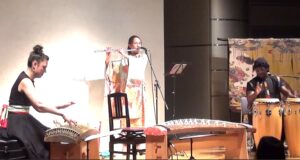
【Performers】
Koto: Maqueen Tokita Miyama
Percussion: Abdou Bayefall
Flute: Kana Fuefuki
By not using ivory, we can enjoy music together—whether you’re someone who wants to protect elephants, someone who feels pain over the conflicts and tragedies surrounding ivory, or someone from a country where ivory trade is banned. A new culture free from ivory has begun here.
From Participant Views
・If something doesn’t exist, just create it. It was a wonderful performance where technology and philosophy came together.
・I play the koto. I had no idea the situation for elephants was this dire.
・It was a truly remarkable event that tangibly demonstrated the message of not consuming ivory to protect elephants.
・I was able to listen to pieces in various styles and learn about the wide range of expressions possible with alternative materials.
・While experiencing traditional culture, I felt the message: ‘Preserving the global environment while connecting cultures.’
・The power of the koto, the power of African drums, Western and Japanease flutes—what a magnificent production. I listened while feeling the tears of African elephants.
・Hearing the performance live truly made me feel its power. It showed that without relying on ivory, human wisdom and effort can forge a path, and we must coexist with animals. The Earth does not belong to humans alone.
Future Activities of the Japan Wildlife Conservation Society
・Participate in CITES CoP20 and advocate that while the Japanese government refuses to close its domestic ivory market, many Japanese consumers do not need ivory
・Introduce CoP discussions to the Japanese public
・Engage in activities aimed at revising Japan’s domestic laws
